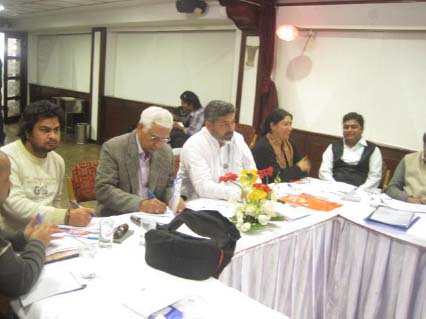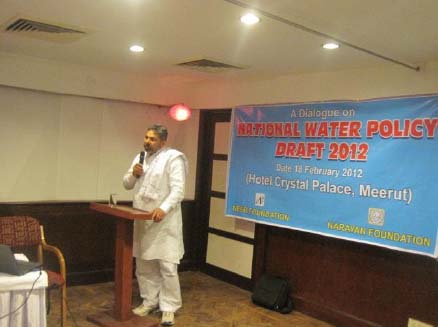Guest post by: Raman Kant Tyagi

Initiating the discussion, Director of NEER Foundation, Raman Kant Tyagi said that this is the third time since 1986 that the Indian Government has prepared a water policy draft towards ensuring proper water management and its proper conservation. According to the government, the draft has been prepared after in depth discussion with the subject experts. The nation's first water policy was enacted in 1986 and the second in 2002. But due to some flaws and gaps in these policies, current over-exploitation of ground water level increased resulting in continuous decline in ground water level and drying of rivers and streams. Secondly, the water pollution increased to such an extent that ground water started getting contaminated at several places leading to severe consequences. Rainy rivers started turning into dirty drains and mountain rivers became means of carrying heavy loads of pollution.
Owing to these reasons, a dire need was being felt of a strong water policy and therefore the Ministry of Water Resources responded through this draft. Raman on behalf of Neer Foundation thanked the government for its initiative towards drafting a new water policy.
During the dialogue, Executive Secretary of India Water Partnership Ms. Veena Khanduri told that a lot of effort and hardwork have been put up towards drafting this policy. Before preparing the draft, discussions have been organised with experts and other stakeholders in different regions across the country which means, the ministry has paid attention and has devoted a lot of time towards making it more effective. Lot of discussions have been organized nationally. Ms. Khanduri also added that over-exploitation and pollution of water is a serious problem but no efforts have gone towards recharge of water which is a much more serious concern. Increasing urbanization and changing weather is escalating the problem further.
During the discussion, Ms. Minakshi Arora from Water Keeper Alliance said that during present times water availability is not a problem but what is actually required is the proper management of available water. Availability of clean drinking water is a major concern and there is a wide gap between the increasing demand and supply. In such a situation, it is important to use the amount of water which is actually needed. River ecosystem sustenance is also the need of the hour. Water is our basic need and food security is also linked with it. We should not rush into the implementation of this policy and sufficient time should be given for inviting suggestions on the draft so that more and more people can discuss the policy.

Ex-Cabinet Minister Sh. Sompal Shastri added to the discussion saying that like earlier policies, this policy draft also reflects the regulatory nature of the government so that they can intervene as and when required. We should keep in mind that too much interference leads to heightened corruption.
Today we have greater manpower working on the canal systems as compared to the past but we get to see poor management while in earlier times when there was lack of resources and manpower was less, management was much better. Public private partnership theory should be reconsidered. In earlier times, warabandi used to be done through proclamation, drains were cleaned through own initiatives and channels were V-shaped which helped continuous regular and reverse flow of water. Development of water resources is required today. We should also keep in mind that if irrigation facilities are made available to the farmers then this will simultaneously help in drinking water availability for them.
National Spokesperson of Bharatiya Kisan Union, Mr Rakesh Tikait said that suggestions from farmers should also be considered for this policy. Government should provide a platform to the farmers so that even they can share their views on the policy. Small check dams should be constructed over small rainfed rivers. Policy will be considered as strong only if it is drafted considering the views of all the stakeholders equally. Attention should be paid towards water pollution which is continuously expanding to more and more villages.
Dr. Sukesh Sahni from Groundwater Department also shared his views on the policy draft. He was of a view that the policy should not have similar frame for rich and poor. Also destruction of rivers due to unscientific and illegal activities should be strictly stopped by taking stringent actions against it. River ecosystem should be maintained. Rainwater harvesting should be taken into account seriously and water storage structures such as ponds and johads should be revived, reconstructed and recharged.
Dr. P N Singh, Scientist, Central Ground Water Board proposed that the policy be simple and focused. The simpler the policy would be, more feasible and facilitative would be its execution. It is essential that the policy provisions are made straightforward and in a simple language to avoid any confusion and dual meaning.
Dr. S K Kumar, Retired Engineer, Irrigation Department of Uttar Pradesh emphasized the need for a more robust canal system in the policy. Canal not only contributes to a better irrigation system but also increases water level. Low water usage irrigation techniques should be promoted. He said that “we do not see any harm in fixing prices of water because anything which will be distributed free of cost will be least valued and will be much wasted. In 1947, almost 6,000 liters of water per person per year was available to us, but today the figures have gradually dropped down to less than 2000 liters. We will also have to become aware of the fact that by wasting the water at such a rate, we are contributing towards decreasing the availability. We do not have to follow the western countries. If today, everyone across the world starts following the American lifestyle then we would require an additional 4.6 percent of the earth. Crop rotation is another issue which should be taken into account.”
A number of farmers from Khatri, Khandrawali, Kaul, Bhatipura, Poothi, Antwada, Nanglamal and other regions participated in the dialogue - Virendar Singh, Kanti Tyagi, Atul Kumar, Ombeer Singh, Amar Singh, Vinay Tyagi, Jitendra Kumar, Pappu Singh, Khajan Singh, Karamveer and Lalit Tyagi.
Finally it was decided that the findings of discussion will be compiled and sent to Government of India for consideration.
Suggestions by farmers –
- Farmers should get timely supply of water for their crops. (Kanti Tyagi)
- Promotion of organic farming should also be included in the policy because organic crops need less water usage. (Amar Singh)
- Industrial units should be fined for polluting water. (Ombir Singh)
- Water management groups should function on the lines of cooperatives. (Vinay Tyagi)
- Government tubewells are defunct. They should be brought into operation so that installation of private tubewells can be reduced. (Birendra Singh)
- Canals should not be cemented as it is leading to lowering of groundwater levels. (Atul Kumar)
Major gaps identified in the draft policy are –
- Need for water framework law: As the ground water is being used widely for drinking and irrigation purposes by individuals especially farmers and villagers, the central law will have adverse impact on the accessibility to ground water. The right of individuals to use the ground water from their land should not be disturbed if it is being used for one’s personal use like drinking purposes or irrigation of their own fields. The commercial use of water should be discouraged as far as possible. Sale and supply by private tankers should be banned and only government agencies shall supply water if required. The Indian Easement Act, 1882 may be modified in such a way that individual right on water if it is being used for his personal use shall not be disturbed.
- Uses of water: Point 3.3 point where it is mentioned that water must be used as an economic good with higher priority towards basic livelihood support to the poor and ensuring national food security has a contradiction. If the water is considered as an economic good, there is possibility of rich exploiting the same for their purposes. The priority of uses should be pronounced categorically in clear terms. Water should not be considered as an economic good. Traditionally water is revered as divine in India and should not be considered as an economic good at any cost. Access to water should be defined in clear terms. While promoting community based water management practices, the right of individual to water shall not be denied. As right to water is considered as a basic fundamental right and defined along with right to life in our constitution, community based water management practices should not disturb the basic right of right to water.
- Enhancing water availability for use: To promote large scale rain water harvesting and artificial recharge to ground water, a separate organization under MoWR should be constituted at the central level. Flagship programmes like Dug Well Recharge; Renovation, Repair and Rehabilitation (RRR); Artificial Recharge to Ground Water and Farmers Participatory Research Action Research Programme (FPARP) should be brought under this organization. This organization shall also be given the responsibility of co-ordinating with different ministries/organization/state governments in the implementation of MGNREGA. Necessary funds may be mobilized by levying a cess on water used by different agencies from the facilities like percolation tanks, nala bunds etc., thus created. Active flood plains can also be utilized for creating additional storages. Projects like dewatering and refilling of aquifers underlying active flood plains which are a big success in Delhi need to be implemented all over the country. Localized planning especially at village level should be promoted for Integrated Water Resources Management (IWRM) with locally available knowledge base.
- Water pricing: The clause 7.5 of the draft national water policy should be deleted. Free electricity to pump sets for irrigation where state fails to provide surface water irrigation through canal networking system need to be given. As agriculture is not a profitable venture anymore and returns are already diminishing due to increased labor costs and farm inputs, withdrawal of free electricity costs very dear to the farmers especially small and marginal farmers. In case water is being wasted due to free electricity, farmers can be educated and made aware of finite ground water resources and can be encouraged to use the water judiciously by mass awareness programs through agricultural extension programmes. All state agricultural departments should have one division for promoting the efficient use of water in agriculture and irrigation sector.
- Institutional arrangements: In clause 13.4 of the draft national water policy it is mentioned that water related services should be transferred to community/private sector with appropriate “public private partnership”. Drinking water supplies i.e., in urban areas need to be considered under this provision. Private sector participation in irrigation sector especially in ground water irrigation will be a chaos and there is a need to be cautious while promoting private sector participation in irrigation sector.
/articles/draft-national-water-policy-2012-dialogue-organised-neer-foundation-meerut-february-18